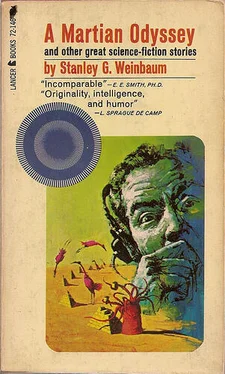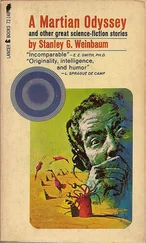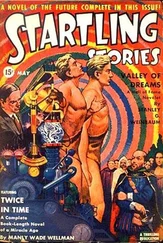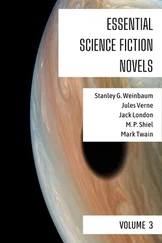Stanley Weinbaum - The Worlds of If
Здесь есть возможность читать онлайн «Stanley Weinbaum - The Worlds of If» весь текст электронной книги совершенно бесплатно (целиком полную версию без сокращений). В некоторых случаях можно слушать аудио, скачать через торрент в формате fb2 и присутствует краткое содержание. Жанр: Фантастика и фэнтези, на английском языке. Описание произведения, (предисловие) а так же отзывы посетителей доступны на портале библиотеки ЛибКат.
- Название:The Worlds of If
- Автор:
- Жанр:
- Год:неизвестен
- ISBN:нет данных
- Рейтинг книги:5 / 5. Голосов: 1
-
Избранное:Добавить в избранное
- Отзывы:
-
Ваша оценка:
- 100
- 1
- 2
- 3
- 4
- 5
The Worlds of If: краткое содержание, описание и аннотация
Предлагаем к чтению аннотацию, описание, краткое содержание или предисловие (зависит от того, что написал сам автор книги «The Worlds of If»). Если вы не нашли необходимую информацию о книге — напишите в комментариях, мы постараемся отыскать её.
The Worlds of If — читать онлайн бесплатно полную книгу (весь текст) целиком
Ниже представлен текст книги, разбитый по страницам. Система сохранения места последней прочитанной страницы, позволяет с удобством читать онлайн бесплатно книгу «The Worlds of If», без необходимости каждый раз заново искать на чём Вы остановились. Поставьте закладку, и сможете в любой момент перейти на страницу, на которой закончили чтение.
Интервал:
Закладка:
The Worlds of If
by Stanley Grauman Weinbaum
I stopped on the way to the Staten Island Airport to call up, and that was a mistake, doubtless, since I had a chance of making it otherwise. But the office was affable. "We'll hold the ship five minutes for you," the clerk said. "That's the best we can do."
So I rushed back to my taxi and we spun off to the third level and sped across the Staten bridge like a comet treading a steel rainbow. I had to be in Moscow by evening, by eight o'clock, in fact, for the opening of bids on the Ural Tunnel. The Government required the personal presence of an agent of each bidder, but the firm should have known better than to send me, Dixon Wells, even though the N. J. Wells Corporation is, so to speak, my father. I have a — well, an undeserved reputation for being late to everything; something always comes up to prevent me from getting anywhere on time. It's never my fault; this time it was a chance encounter with my old physics professor, old Haskel van Manderpootz. I couldn't very well just say hello and good-bye to him; I'd been a favorite of his back in the college days of 2014.
I missed the airliner, of course. I was still on the Staten Bridge when I heard the roar of the catapult and the Soviet rocket Baikal hummed over us like a tracer bullet with a long tail of flame.
We got the contract anyway; the firm wired our man in Beirut and he flew up to Moscow, but it didn't help my reputation. However, I felt a great deal better when I saw the evening papers; the Baikal , flying at the north edge of the eastbound lane to avoid a storm, had locked wings with a British fruitship and all but a hundred of her five hundred passengers were lost. I had almost become "the late Mr. Wells" in a grimmer sense.
I'd made an engagement for the following week with old van Manderpootz. It seems he'd transferred to N.Y.U. as head of the department of Newer Physics — that is, of Relativity. He deserved it; the old chap was a genius if ever there was one, and even now, eight years out of college, I remember more from his course than from half a dozen calculus, steam and gas, mechanics, and other hazards on the path to an engineer's education. So on Tuesday night I dropped in an hour or so late, to tell the truth, since I'd forgotten about the engagement until mid-evening.
He was reading in a room as disorderly as ever. "Humph!" he grunted. "Time changes everything but habit, I see. You were a good student, Dick, but I seem to recall that you always arrived in class toward the middle of the lecture."
"I had a course in East Hall just before," I explained. "I couldn't seem to make it in time."
"Well, it's time you learned to be on time," he growled. Then his eyes twinkled. "Time!" he ejaculated. "The most fascinating word in the language. Here we've used it five times (there goes the sixth time — and the seventh!) in the first minute of conversation; each of us understands the other, yet science is just beginning to learn its meaning. Science? I mean that I am beginning to learn."
I sat down. "You and science are synonymous," I grinned. "Aren't you one of the world's outstanding physicists?"
"One of them!" he snorted. "One of them, eh! And who are the others?"
"Oh, Corveille and Hastings and Shrimski — "
"Bah! Would you mention them in the same breath with the name of van Manderpootz? A pack of jackals, eating the crumbs of ideas that drop from my feast of thoughts! Had you gone back into the last century, now — had you mentioned Einstein and de Sitter — there, perhaps, are names worthy to rank with (or just below) van Manderpootz!"
I grinned again in amusement. "Einstein was considered pretty good, wasn't he?" I remarked. "After all, he was the first to tie time and space to the laboratory. Before him they were just philosophical concepts."
"He didn't!" rasped the professor. "Perhaps, in a dim, primitive fashion, he showed the way, but I — I , van Manderpootz — am the first to seize time, drag it into my laboratory, and perform an experiment on it."
"Indeed? And what sort of experiment?"
"What experiment, other than simple measurement, is it possible to perform?" he snapped.
"Why — I don't know. To travel in it?"
"Exactly."
"Like these time-machines that are so popular in the current magazines? To go into the future or the past?"
"Bah! Many bahs! The future or the past — pfui! It needs no van Manderpootz to see the fallacy in that. Einstein showed us that much."
"How? It's conceivable, isn't it?"
"Conceivable? And you, Dixon Wells, studied under van Manderpootz!" He grew red with emotion, then grimly calm. "Listen to me. You know how time varies with the speed of a system — Einstein's relativity."
"Yes."
"Very well. Now suppose then that the great engineer Dixon Wells invents a machine capable of traveling very fast, enormously fast, nine-tenths as fast as light. Do you follow? Good. You then fuel this miracle ship for a little jaunt of a half million miles, which, since mass (and with it inertia) increases according to the Einstein formula with increasing speed, takes all the fuel in the world. But you solve that. You use atomic energy. Then, since at nine-tenths light-speed, your ship weighs about as much as the sun, you disintegrate North America to give you sufficient motive power. You start off at that speed, a hundred and sixty-eight thousand miles per second, and you travel for two hundred and four thousand miles. The acceleration has now crushed you to death, but you have penetrated the future." He paused, grinning sardonically. "Haven't you?"
"Yes."
"And how far?"
I hesitated.
"Use your Einstein formula!" he screeched. "How far? I'll tell you. One second! " He grinned triumphantly. "That's how possible it is to travel into the future. And as for the past — in the first place, you'd have to exceed light-speed, which immediately entails the use of more than an infinite number of horsepowers. We'll assume that the great engineer Dixon Wells solves that little problem too, even though the energy out-put of the whole universe is not an infinite number of horsepowers. Then he applies this more than infinite power to travel at two hundred and four thousand miles per second for ten seconds. He has then penetrated the past. How far?"
Again I hesitated.
"I'll tell you. One second! " He glared at me. "Now all you have to do is to design such a machine, and then van Manderpootz will admit the possibility of traveling into the future — for a limited number of seconds. As for the past, I have just explained that all the energy in the universe is insufficient for that."
"But," I stammered, "you just said that you — "
"I did not say anything about traveling into either future or past, which I have just demonstrated to you to be impossible — a practical impossibility in the one case and an absolute one in the other."
"Then how do you travel in time?"
"Not even van Manderpootz can perform the impossible," said the professor, now faintly jovial. He tapped a thick pad of typewriter paper on the table beside him. "See, Dick, this is the world, the universe." He swept a finger down it. "It is long in time, and" — sweeping his hand across it — "it is broad in space, but" — now jabbing his finger against its center — "it is very thin in the fourth dimension. Van Manderpootz takes always the shortest, the most logical course. I do not travel along time, into past or future. No. Me, I travel across time, sideways!"
I gulped. "Sideways into time! What's there?"
"What would naturally be there?" he snorted. "Ahead is the future; behind is the past. Those are real, the worlds of past and future. What worlds are neither past nor future, but contemporary and yet — extemporal — existing, as it were, in time parallel to our time?"
Читать дальшеИнтервал:
Закладка:
Похожие книги на «The Worlds of If»
Представляем Вашему вниманию похожие книги на «The Worlds of If» списком для выбора. Мы отобрали схожую по названию и смыслу литературу в надежде предоставить читателям больше вариантов отыскать новые, интересные, ещё непрочитанные произведения.
Обсуждение, отзывы о книге «The Worlds of If» и просто собственные мнения читателей. Оставьте ваши комментарии, напишите, что Вы думаете о произведении, его смысле или главных героях. Укажите что конкретно понравилось, а что нет, и почему Вы так считаете.












